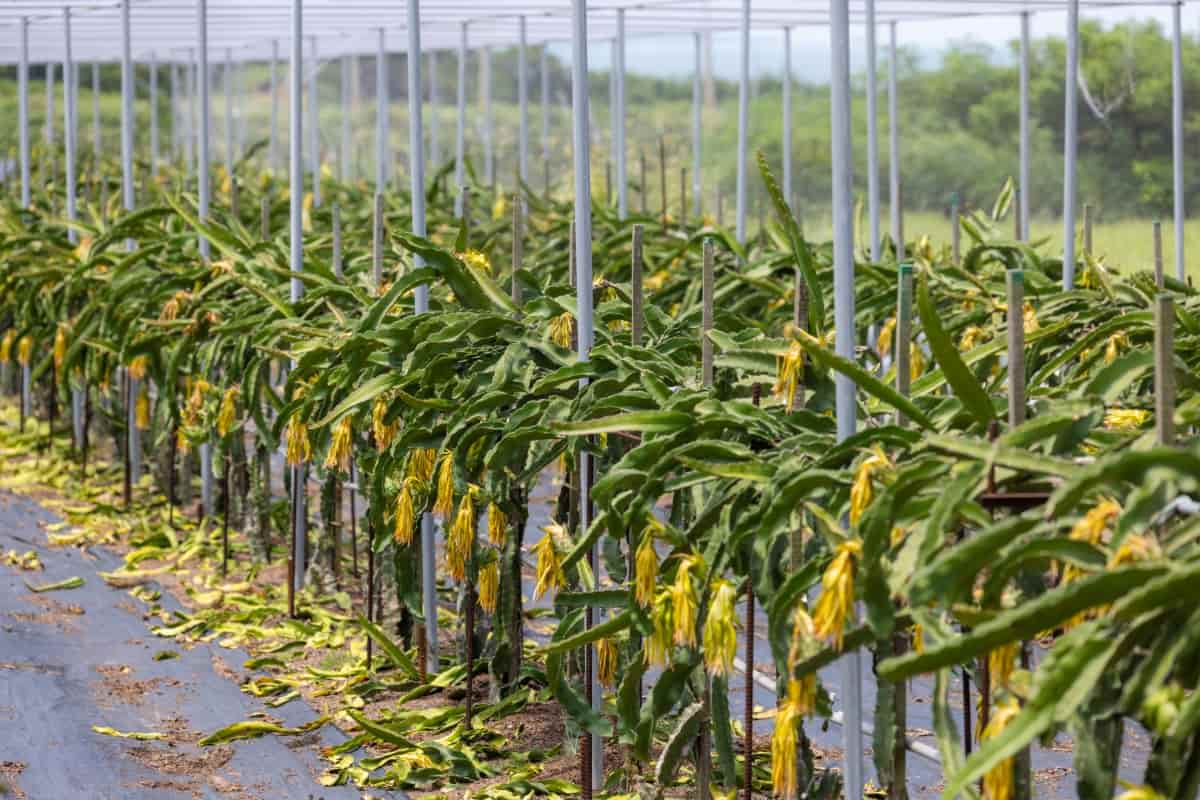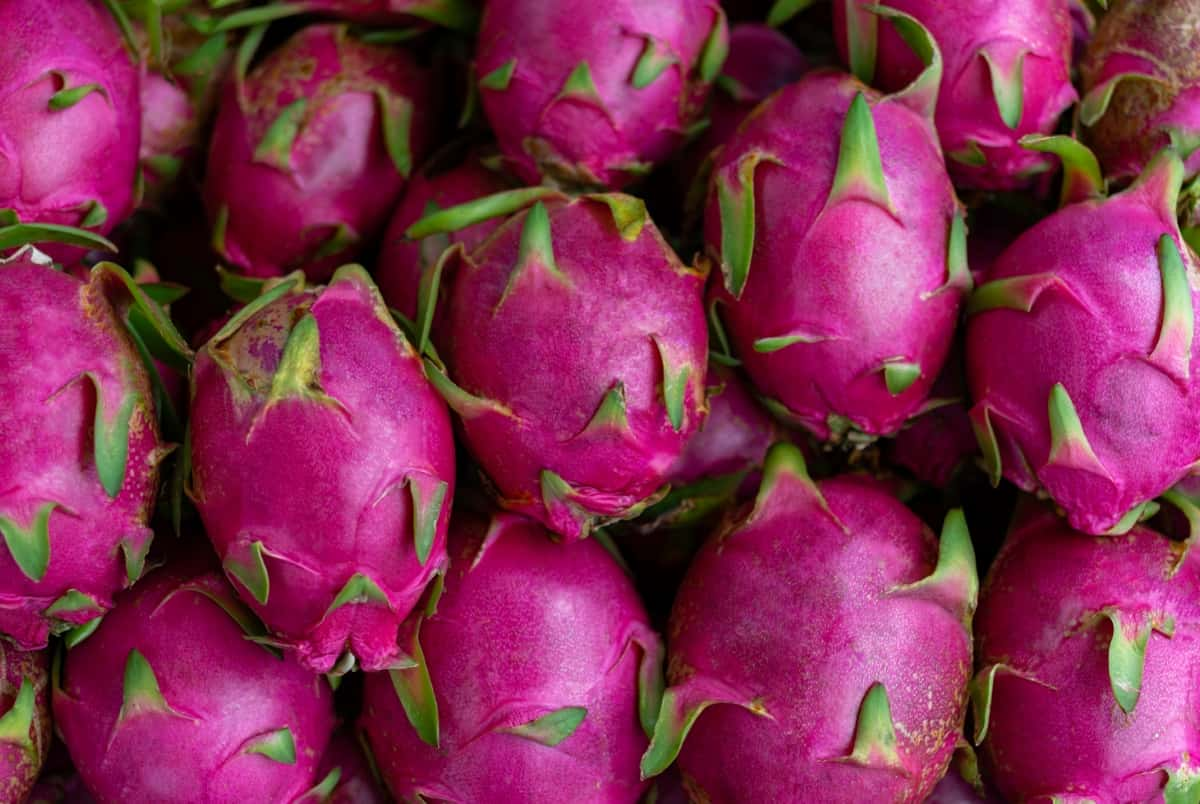Contract farming, in particular, is gradually becoming popular, as it offers farmers the security of guaranteed demand and prices while simultaneously providing contracting companies with a stable supply of agricultural products. Dragon Fruit, an exotic fruit from Central America, is receiving great attention and is now cultivated in various regions, including India. Known for its unique appearance, nutritional value, and high market value, Dragon Fruit contract farming in India is rapidly increasing.

Dragon Fruit Contract Farming in India
Dragon Fruit Contract Farming Benefits
The benefits of Dragon Fruit contract farming are multi-dimensional. Firstly, Dragon Fruit is a high-value crop that has found a growing market in India due to its rich nutritional profile. Consequently, contract farming allows farmers to diversify their income source and reduce their dependence on traditional crops. Farmers entering such contracts can avail of technical assistance from the contracting company to increase their yield and quality, thereby boosting their income significantly.
Furthermore, Dragon Fruit farming requires less water than traditional crops, making it a more sustainable option for regions facing water scarcity. It is also less susceptible to diseases, which further cuts down the cost of cultivation. Lastly, the fact that the contracts ensure a predefined price for the crop shields farmers from volatile market prices, adding to their financial stability.
Profitability of Dragon Fruit Contract Farming in India
The profitability of Dragon Fruit contract farming in India is promising. The fruit is a lucrative crop, commanding high prices in the market. Considering its current demand in urban markets and export potential, farmers involved in Dragon Fruit farming under contract can expect a good return on their investment. A kilogram of Dragon Fruit can fetch a price of around INR 200 to 300 in the domestic market, and with an average yield of 6-7 tons per acre per year, farmers can expect substantial profits.
Moreover, companies involved in the contract farming of Dragon Fruit often offer technical guidance and financial assistance to farmers, ensuring the best cultivation practices are followed for optimal yield. The contractual agreements, combined with the high-value crop, thus, can contribute to significantly increasing the farmer’s income.
Dragon Fruit Contract Farming Agreements
Dragon Fruit contract farming agreements in India typically involve an arrangement between farmers and a contracting company, often an exporter or a large-scale purchaser. The contracting company usually agrees to buy a specific quantity of Dragon Fruit at a predetermined price, which insulates the farmer from market price volatility. In exchange, the farmer commits to cultivating Dragon Fruit following the specifications and guidelines set by the contracting company to ensure quality control.
These agreements may also include provisions for the contracting company to support farmers regarding access to quality planting material, training in best practices for cultivation, and some cases, financial assistance. It’s important for farmers to fully understand the terms and conditions of these agreements to ensure they benefit optimally from the arrangement.
Best Practices for Dragon Fruit Contract Farming
Dragon Fruit farming requires specific conditions for optimal growth. For starters, it thrives in a dry tropical climate with moderate rainfall. Over-watering can lead to root rot, so irrigation systems must be carefully managed. A trellising system is also crucial for Dragon Fruit cultivation, as the plant is a climbing cactus.
In case you missed it: How to Increase Female Flowers in Dragon Fruit/Pitaya: Explained in 10 Steps for More Yields and Profit

Choosing the right planting material is vital. Farmers should opt for high-quality cuttings from mature, disease-free plants. Training and pruning of the plants are essential for enhanced yield and easier management. Soil pH should range from 6 to 7, and plants require consistent use of both organic and inorganic fertilizers. Protection against pests and diseases is also necessary. Common pests affecting Dragon Fruit plants include aphids, mealybugs, and fruit flies, while fungal diseases can also pose a threat.
Integrated pest management practices are recommended, involving regular monitoring, biological control methods, and the judicious use of pesticides. Moreover, as part of contract farming, companies often offer training programs for farmers, ensuring that the best agricultural practices are adopted for cultivation. This not only improves the quality and yield of the crop but also promotes sustainable farming practices.
Dragon Fruit Contract Farming Opportunities in India
Dragon Fruit contract farming holds substantial opportunities for the Indian agrarian sector. With the rise in health consciousness among the population, there is a growing demand for nutrient-rich exotic fruits like Dragon Fruit. Moreover, urbanization and rising income levels create a thriving market for high-value crops.
India’s diverse agro-climatic conditions also provide ample opportunities for cultivating Dragon Fruit in various parts of the country. Given their suitable climatic conditions, countries like Gujarat, Maharashtra, Andhra Pradesh, Telangana, Karnataka, and Kerala have already started promoting Dragon Fruit farming. Furthermore, the export potential of Dragon Fruit opens up opportunities for farmers to tap into the global market.
Contract farming also attracts investment from private companies, which see a promising business opportunity in the Dragon Fruit market. These companies enter into contractual agreements with farmers, providing them with the necessary support and assurance of a secured market, thus offering a win-win situation for both parties.
Dragon Fruit Contract Farming Requirements in India
To successfully participate in Dragon Fruit contract farming, there are specific requirements that farmers must meet. Firstly, the land is the prime requisite for farming. Dragon Fruit plants are strong and flexible, able to thrive in various soil types. However, they thrive best in well-drained sandy to clay loam soils with a pH level of 6 to 7. Secondly, the availability of quality planting materials is a must.
High-yielding, disease-free cuttings are preferred. Also, the plants require a robust support structure, like a concrete pole with a sturdy top frame, as they are climbing cacti. Thirdly, the farmers must have access to adequate water for irrigation, although Dragon Fruit farming is less water-intensive than many traditional crops. Knowledge of the appropriate cultivation practices is another critical requirement.
Contracting companies usually provide necessary training to the farmers in this regard. Lastly, entering into a contractual agreement with a reliable company is crucial. Farmers should do due diligence on the financial stability and reputation of the contracting company to avoid potential disputes or defaults on the contract.
Dragon Fruit Contract Farming Companies in India
Several companies in India have ventured into Dragon Fruit contract farming, seeing its potential profitability and growing demand. These include companies like Bigbasket, Nature’s Best, and Freshtrop, among others, engaged in the large-scale purchasing and selling of the fruit.
In case you missed it: How to Grow Dragon Fruit in a Greenhouse: A Step-By-Step Guide for Seed to Harvest

Several start-ups and local agribusinesses are also encouraging Dragon Fruit cultivation through contract farming, especially in states like Gujarat and Maharashtra. These companies provide farmers with planting materials, technical guidance, and financial support, thus bolstering the contract farming landscape.
Conclusion
Dragon Fruit contract farming presents a substantial opportunity for enhancing the profitability of Indian agriculture while promoting sustainable farming practices. With the right policies and strategies, it can significantly contribute to the farmers’ income and the overall growth of the agrarian sector.
- Feed Your Flock for Less: Top 10 Tips to Save on Chicken Feed
- Ultimate Guide to Ossabaw Island Hog: Breeding, Raising, Diet, and Care
- Hatching Answers: The Top 10 Reasons Your Chickens Aren’t Laying Eggs
- Eggs and Economics: Breaking Down the Cost of Raising Backyard Chickens
- Defend Your Greens: Proven Methods to Keep Iguanas Out of Your Garden
- Ultimate Guide to Cinnamon Queen Chicken: A Comprehensive Guide for Beginners
- Ultimate Guide to California Tan Chicken: Breeding, Raising, Diet, Egg-Production and Care
- Ultimate Guide to Marsh Daisy Chicken: Breeding, Raising, Diet, and Care
- 10 Types of Chicken Farming Businesses You Can Start for Profits
About dragon fruit contract farming